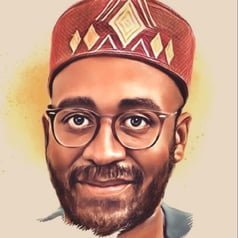Nessan Akemakou : “the fourth industrial revolution has begun and it is digital”
Artificial intelligence, blockchain, mobile banking: how can Africa harness digital technology to boost economic growth? This was the theme of the annual conference of the think tank L'Afrique des idées, held in Paris on November 7. We spoke to its president, Nessan Akemakou.

Interview by Mérième Alaoui

Nessan Akemakou, can you introduce yourself?
I’m a political science researcher at the University of Ottawa and President of the think tank L’Afrique des idées. It was originally an association founded in 2011 by African students at Sciences Po in Paris. Since then, we have become an independent pan-African think tank. I started as an analyst and then I edited publications. And since June 2022, I have been its president. L’Afrique des idées is a think tank dedicated to providing analysis and concrete proposals on economic, cultural and social issues relating to Africa. It distinguishes itself from other think tanks by promoting a strong concept that is rarely advocated: Afro-responsibility. Neither Afro-optimism nor Afro-pessimism, this paradigm emphasizes the need for Africans, especially the youngest, to reclaim the narrative of their continent. We try to urge young people to take their destiny into their own hands and to mobilize responsibly. Only Africans can defend Africa’s interests and contribute to its development.

How do you see the adoption of artificial intelligence (AI), mobile banking, blockchain and other technological revolutions underway in Africa?
When it comes to AI, the situation remains very uneven. Some countries, such as Morocco, are at the forefront, while others are lagging behind. In terms of mobile banking, it works very well in most countries. Discreetly, a country like Togo has invested heavily in this area. For example, during the pandemic, a number of social services were set up via mobile phones to reach people in rural areas. This is quite innovative and deserves to be highlighted. Finally, when it comes to blockchain, some countries, often English-speaking, are not badly placed, such as Kenya and Ghana.
It is clear that the Fourth Industrial Revolution has begun, and it is a digital one. This digital revolution has led to the rise of the BRICS (Brazil, Russia, India, China and South Africa). In 2003, digital technology accounted for only 20% of global growth. By 2025, this figure is projected to rise to 40-50%. This digitalization of the world is a great opportunity. Africa must seize it to meet all its challenges in education, health, development and so on. Much progress has been made. More than a billion Africans own a mobile phone, and internet penetration on the continent has risen sharply, with more than 450 million people connected.
What are the main challenges?
According to the index, which measures countries’ ability to support the IT sector, no African country is in the top 40. South Africa is ranked 47th. No African country is in the top 30 in the ranking that measures the number of operational industrial robots per 10,000 workers. South Africa has only 28 industrial robots per 10,000 workers, compared with a global average of 74. In addition to these challenges, Africa still needs to improve its internet bandwidth. Connection rates remain relatively low. Although penetration has increased, the average speed remains inadequate. Finally, five African countries are in the top 10 of countries where connection is the most expensive. In a broader sense, this relates to the problem of the lack of available and adequate infrastructure on the continent. I can also add human capital. Although progress is being made in this area, there is a real shortage of skilled and trained labor in Africa, while young people suffer from mass unemployment. There needs to be a better match between the needs of the economy and current education. Public policies do not always take a quite broad and eco-systemic view of these issues.
Is there any reason to remain optimistic?
I remain resolutely optimistic. I always compare myself with the best to see how far we still have to go. The negative aspects mainly concern public policy, at the government level. Nevertheless, people are embracing digital tools. They are even very resilient and manage to come up with fascinating initiatives every day. In some countries, things are really bubbling over. I’m thinking of Morocco. We were just talking about AI. Did you know that the Mohammed VI Polytechnic University is home to the world-renowned International Artificial Intelligence Center? We need to encourage these initiatives. Too often, Africans undervalue themselves. Hence the importance of storytelling. The potential is there, but it is often untapped.
When it comes to blockchain, what do you see as priority sectors? The ones that could be completely transformed thanks to this secure and tamper-proof chain of data?
The issue of securing land registries is often raised, and it is indeed one of the priority sectors. Land ownership in Africa remains a very recurrent problem, and many disputes are linked to it. More generally, the administrative sector in general could benefit from blockchain, such as the issuance of ID cards and passports. Data management is a very good way to reduce errors and delays. Rwanda is the most advanced country in terms of dematerialization. Other sectors, such as logistics, could benefit from blockchain. Supply chains will be able to track their exports more easily and build relationships based on trust.
African innovations such as mobile banking are being developed in northern countries. What are your thoughts on this?
The meteoric rise of mobile banking in Africa started with a simple observation. With very low banking penetration, few people had access to a credit card. This is what we call reverse organic innovation. Organic because the innovation starts from a local reality. There are other examples in healthcare. We have a good example among our panelists: Mountaga Keïta, head of Tulip Industries. His innovations have won international awards. They include telemedicine kiosks, drones, tablets equipped with thermal cameras and sensors that measure body temperature, blood oxygen levels, heart rate… All this has been very useful for COVID. His African-born innovations are inspiring Western companies, some of which want to buy his patents. Culturally, Africans are highly networked and quick to adopt digital tools.
Going forward, what are the key issues that Africans need to address to make this digital revolution a reality? We often talk about the sovereign cloud.
It’s true that data is the new black gold. The stakes are colossal. Looking ahead, the question is: what do we do with this data, which has enormous potential? The sovereign cloud is a real challenge. The issue of data hosting and processing is very important. More than 60% of the cloud market is held by three American companies: Amazon, Google and Microsoft. This raises real questions about independence, given that most governments host their data on these servers. In terms of intergovernmental competition, this is frightening. Not to mention the fact that the US has rules that allow it to recover data from suppliers operating in the US market. At the same time, many observers believe that a completely sovereign cloud is a pipe dream because of the interdependence of this economy. Nevertheless, African tools need to be put in place. Whatever we do in Africa on this issue, we need to respond collectively.






